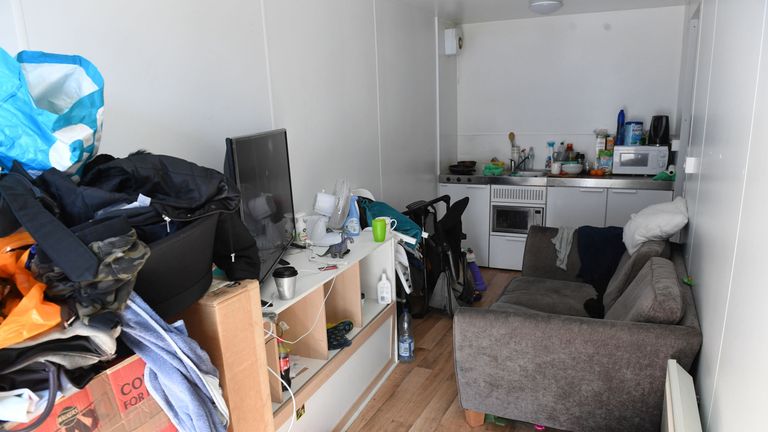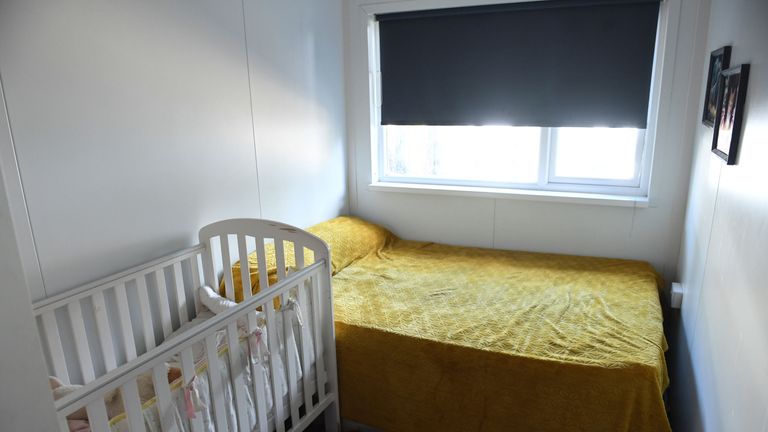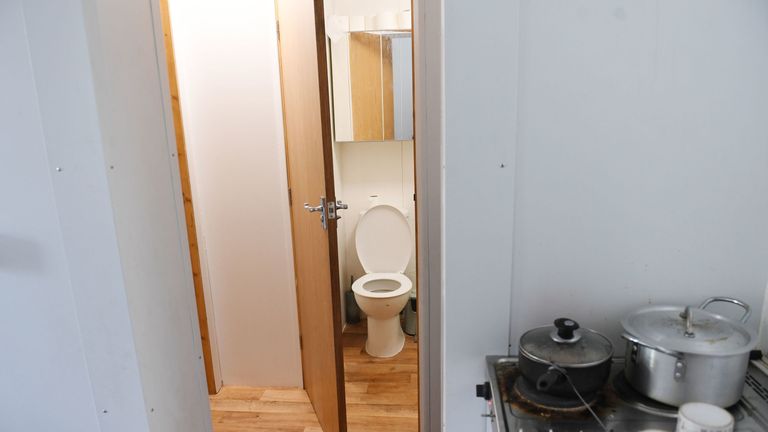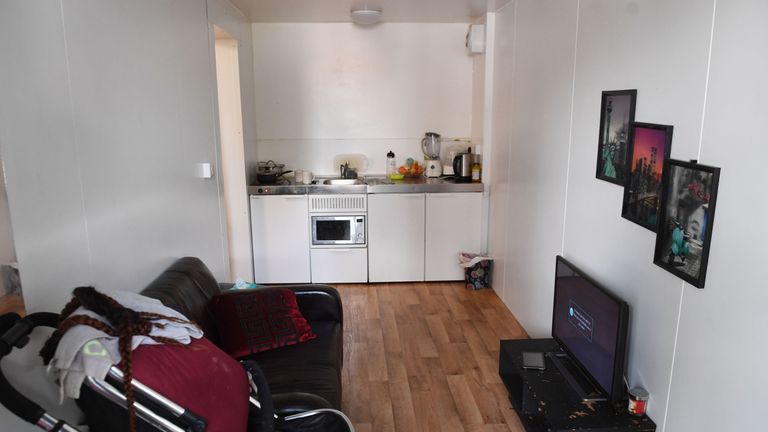Children ‘robbed of childhood’ as families housed in converted shipping containers and offices
Thousands of children are being “robbed” of a decent childhood by growing up in converted shipping containers and office blocks, say campaigners.
There may be more than 210,000 children without a permanent home in England, according to the Bleak Houses report by the Children’s Commissioner for England.
It comes amid a rise in the use of converted office blocks and shipping containers as temporary accommodation, which the commissioner warned are frequently not fit to live in.
Ealing Council is one of those using “heavily modified” shipping containers to house people in west London.
The steel containers, which have a kitchenette, shower room and bedroom, become home for people who may otherwise be in B&Bs or other interim housing.
The council says they are “innovative” and provide a “stable, comfortable environment for vulnerable homeless families”.
Corelle Tertullien, a mother of two, was moved into a container in December, shortly before she was due to give birth. She had previously been in a hostel in Southall, west London and was moved to nearby Hanwell.
She said: “When I got the phone call, he said, ‘oh, we have a flat for you’.
“And then when I came here, I realised obviously this is not a flat. This is a shipping container.
“When they tell you, they make it out like it’s a flat or a house, but no, it’s a shipping container.”
Ms Tertullien, who had to move out of her family home because of overcrowding, is now living in one of the 34 containers, which have been stacked up and clad with wood to resemble a housing estate.
She said: “We’re all sleeping in one bed at the moment because I can’t fit the cot in here, there’s no space.
“There’s no bathtub. Originally I was washing him [her baby] in the kitchen sink but now I wash him on the floor, getting a cup and washing him that way, because he’s too big to fit in the sink now.”
She said the lack of circulation means the containers are prone to overheating, and that leads to condensation dripping from the ceiling.
They are forced to have a fan on constantly, or have to leave the door open. She said her sons, one aged two and the other nine months, are in nappies most of the time because of the heat.
While the 26-year-old shopping assistant has been there for nine months, she is still not sure when she will be able to leave. Another resident has been there for three years.
Someone else – who had been in the Calais “jungle” in France – cried when she arrived at her new home.
The 29-year-old, who did not want to be named, said: “It’s better than Calais but no-one wishes to live in a container, especially when you have kids.
“When I got here and saw all of this, the container, I was crying.”
She even said it was worse than when she lived in a “normal house” in Eritrea and Sudan.
The commissioner’s report says about 124,000 children are officially classed as homeless or in temporary accommodation, with another 90,000 in “sofa-surfing families”.
But a lack of data means the real figures could be higher.
In Harlow, Essex, 13 office blocks have been converted into more than 1,000 individual flats.
Some units measure 18 square metres (194 square foot) and are being used to house whole families, with parents and children sleeping in a single room which is also used as the kitchen.
Polly Neate, chief executive of Shelter, said homelessness was “robbing… children of a decent childhood”.
She added: “No child should be spending months if not years living in a converted shipping container, a dodgy old office block or an emergency B&B.
“But a cocktail of punitive welfare policies, a woeful lack of social homes and wildly expensive private rents mean this is frighteningly commonplace.
“We constantly hear from struggling families forced to accept unsuitable, and sometimes downright dangerous accommodation because they have nowhere else to go.
“The devastating impact this has on a child’s development and wellbeing cannot be overstated.”
In 2018, 23,000 families were put in temporary accommodation outside their home council area, having a “deeply disruptive impact”.
Children’s Commissioner Anne Longfield expressed concern about B&Bs being used as temporary accommodation, saying the mixed use of bathrooms between vulnerable adults and people with mental health or drug abuse problems could be “potentially unsafe” for children.
Ms Longfield said: “Something has gone very wrong with our housing system when children are growing up in B&Bs, shipping containers and old office blocks.
“Children have told us of the disruptive and at times frightening impact this can have on their lives.
“It is a scandal that a country as prosperous as ours is leaving tens of thousands of families in temporary accommodation for long periods of time, or to sofa surf.
“It is essential that the government invests properly in a major house-building programme and that it sets itself a formal target to reduce the number of children in temporary accommodation.”
An Ealing Council spokesman said it was one of the first councils “to use innovative modular homes as temporary accommodation”.
“Made from heavily modified shipping containers, the homes offer a stable, comfortable environment for vulnerable homeless families who have nowhere else to go,” said the spokesman,
“While we would rather offer people the opportunity to live in genuinely affordable permanent homes, the housing crisis means we have no choice but to use temporary accommodation to house the sheer volume of homeless households that present to us.”
Source: Read Full Article






